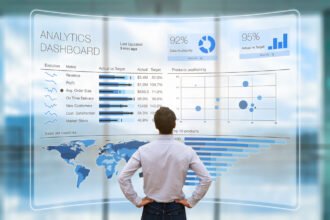In the world of government, intelligence is essential for gaining the information needed to make key decisions. When you hear the word “intelligence,” the chances are pretty good that you think first of government intelligence agencies like the CIA, the NSA, or Britain’s MI6. Their intelligence-gathering operations are vast, and they supply their governments with the information necessary to make sense of complex events around the world. The business world also has a need for intelligence, and business intelligence serves much the same function in the business community. It may not have the same dramatic intrigue as the world of James Bond and Jack Ryan, but in its own way business intelligence can be equally fascinating. In this article, we’ll take a look at some of the reasons that business intelligence, or BI, is an indispensable asset to a modern organization.
There are many important reasons that even small and midsize businesses will want to invest in BI to gain a competitive advantage. Let’s take a look at six of the most important:
- BI turns data into usable information. Raw data doesn’t tell us what to do in business all on its own. BI systems allow for comprehensive analysis of data to identify important trends that can be used to modify or implement strategic plans and to understand the interconnections between different functions and facets of your business.
- BI improves the visibility of core business components. BI makes it easier to see each component part of your business, including those that are often overlooked. Consequently, you can more easily identify components that need improvement and to make changes.
- BI improves your ROI and ability to achieve goals. BI analysis allows you to understand how best to allocate resources to meet your stated goals. This allows you to increase your ROI by ensuring that resources are deployed strategically to achieve fixed goals, and it helps to prevent “mission drift” or “mission creep” where outcomes no longer align to goals.
- BI improves your understanding of consumer behavior. BI analysis allows you to track global, regional, and local consumption patterns to better understand current trends. This, in turn, allows you to develop and deliver products and services that anticipate market needs.
- BI improves your marketing and sales intelligence. By keeping track of data about your clients and customers, BI allows you to understand how they interact with your organization at a deeper level so you can identify solutions to consumer issues and better reach your customers with targeted messages to increase sales.
- BI improves productivity. BI makes the process of analyzing and interpreting data faster and more efficient, giving you the power to understand business data as quickly as it comes in, and it allows you to generate reports with the simple click of a mouse. This give you and your employees more time to devote to running your business rather than analyzing it.
For decades, BI has been the province of large organizations, the types of companies that can afford elaborate data collection centers and the computing power to analyze that data. But with the development of affordable data analysis tools, small and medium sized businesses now have the ability to participate in the BI revolution as well. For years, small firms have relied on basic desktop publishing and spreadsheet programs to keep track of their data with basic spreadsheets, but now dedicated BI platforms are affordable and many times more powerful than a spreadsheet for analyzing and understanding business data. New end-user BI interfaces even allow for natural language queries, responding to questions such as “What were my 5 top-selling products last month?” by culling answers from your business’s collected data.
Ultimately, business intelligence analysis of key data removes the guesswork from business by quantifying solutions to complex problems rather than relying on vague impressions or gut instincts. This scientific revolution can make your business leaner and more efficient at every stage. After all, when your company’s future is at stake, would you rather trust a manager’s gut feeling, or a comprehensive set of statistical data that can analyze past trends and extrapolate likely future results? How much are you willing to bet on a feeling vs. a statistical analysis?










